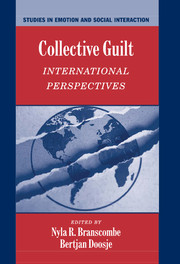Book contents
- Frontmatter
- Contents
- Preface
- List of Contributors
- Collective Guilt
- Section 1 Defining the nature of collective guilt
- Section 2 The Relationship Between Group Identification and Collective Guilt
- Section 3 Consequences for Intergroup Relations
- 11 Intergroup Forgiveness and Guilt in Northern Ireland: Social Psychological Dimensions of “The Troubles”
- 12 Intergroup Reconciliation Processes in Israel: Theoretical Analysis and Empirical Findings
- 13 On Whether to Apologize to Indigenous Australians: The Denial of White Guilt
- 14 Racial Wrongs and Restitutions: The Role of Guilt and Other Group-Based Emotions
- 15 Importance of Social Categorization for Forgiveness and Collective Guilt Assignment for the Holocaust
- Section 4 Commentary on the Volume
- Index
- References
13 - On Whether to Apologize to Indigenous Australians: The Denial of White Guilt
Published online by Cambridge University Press: 05 January 2012
- Frontmatter
- Contents
- Preface
- List of Contributors
- Collective Guilt
- Section 1 Defining the nature of collective guilt
- Section 2 The Relationship Between Group Identification and Collective Guilt
- Section 3 Consequences for Intergroup Relations
- 11 Intergroup Forgiveness and Guilt in Northern Ireland: Social Psychological Dimensions of “The Troubles”
- 12 Intergroup Reconciliation Processes in Israel: Theoretical Analysis and Empirical Findings
- 13 On Whether to Apologize to Indigenous Australians: The Denial of White Guilt
- 14 Racial Wrongs and Restitutions: The Role of Guilt and Other Group-Based Emotions
- 15 Importance of Social Categorization for Forgiveness and Collective Guilt Assignment for the Holocaust
- Section 4 Commentary on the Volume
- Index
- References
Summary
In The Guilt of Nations, Barkan (2000) argues that we are in the midst of a “new international morality,” reflected by an increasing willingness of nation-states around the world to apologize for historical injustices. Western leaders, such as Clinton, Blair, Chirac, and Schroder, have all offered national apologies to aggrieved groups for past wrongs. Social psychologists have increasingly turned their attention to the notion of collective or group-based guilt as a means of understanding this recent social phenomenon. Doosje et al., (1998) for example, demonstrated in both laboratory and field studies that group-based guilt could be induced in respondents when the history of exploitation by one's own group toward another group was made salient. Concepts such as group-based guilt and, more specifically, “White guilt” (Steele, 1990) have been theorized to be associated with support for the compensation and reparation of exploited groups for past injustices. Apologizing for previous wrongdoings is recognized as an important first step toward making such amends.
Apologizing to Indigenous Australians for past historical injustices has been a social and political issue at the forefront of national concern in Australia for some time. In April 1997, The Human Rights and Equal Opportunities Commission (HREOC) (1997a) tabled The Report of the National Inquiry Into the Separation of Aboriginal and Torres Strait Islander Children From Their Families: a report that generated unprecedented public debate concerning the maltreatment of Indigenous peoples throughout Australia's colonial history.
- Type
- Chapter
- Information
- Collective GuiltInternational Perspectives, pp. 236 - 261Publisher: Cambridge University PressPrint publication year: 2004
References
- 24
- Cited by



